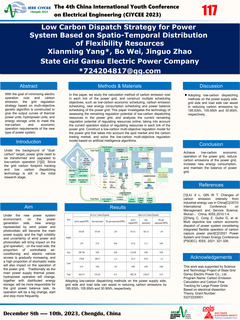Low Carbon Dispatch Strategy for Power System Based on Spatio-Temporal Distribution of Flexibility Resources
ID:149
Submission ID:117 View Protection:ATTENDEE
Updated Time:2023-11-20 13:53:22 Hits:496
Poster Presentation
Abstract
Under the new power system environment, on the power generation side, new energy represented by wind power and photovoltaic will become the main power supply, and the high volatility and uncertainty of wind power and photovoltaic will bring impact on the grid operation; on the load side, the proportion of controllable air-conditioning and electric vehicle access is gradually increasing, and a high proportion of stochastic loads will also impact on the operation of the power grid. Traditionally as the main power supply thermal power, hydropower operation will change, together with distributed energy storage, will be more responsible for the grid power balance task, its operation will be a big change, start and stop more frequently. This paper takes the minimization of grid operation cost and carbon emission as the regulation goal, and balances the volatility and uncertainty of new energy-based power supply on the power supply side and the impact of the randomness of loads such as high proportion of electric vehicles and controllable air conditioners on the load side on the power grid through the regulation and control of traditional thermal power generators, hydropower generators, and distributed power sources. With the goal of minimizing electric operation cost and carbon emission, the grid regulation strategy based on multi-objective genetic algorithm is constructed to give the output curves of thermal power units, hydropower units, and energy storage units to meet the low-carbon and economic operation requirements of the new type of power system.
Keywords
Low Carbon Dispatch,Flexibility Resources,Multi-object Dispatch
Submission Author
Xianming Yang
State Grid Gansu Electric Power Company
Bo Wei
State Grid Gansu Electric Power Company
Jinguo Zhao
State Grid Gansu Electric Power Research Institute




Comment submit